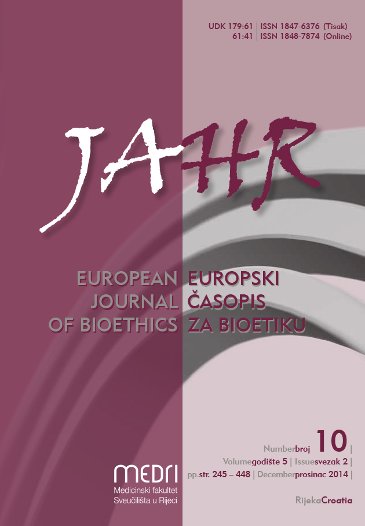Why teach “Bioethics and Human Rights” to healthcare professions undergraduates?
Ključne riječi:
Bioethics, Human Rights, Biolaw, medical students, Nuremberg Trials, Codes of Medical Ethics, conscientious objection.Sažetak
This article highlights the importance of teaching “bioethics and human rights” to
undergraduate students seeking health care degrees and illustrates how this topic fits well within
these programs of studies. Historical, cultural, anthropological and practical reasons support
teaching these topics as enrichment of medical training. The years after the Second World
War showed how bioethics, human rights and medicine are closely intertwined. Moreover the
relationship between human rights and bioethics has grown ever closer increasingly involving
medicine and health care professionals. The authors observe that medical students have to face
a cultural pluralism in bioethics and biolaw and we give students the opportunity to develop
their critical thinking and logical argumentation abilities as well as their interest in academic
research. Furthermore, the authors – who draw up briefly the experience of the Institute of
Bioethics at the Faculty of Medicine and Surgery of the UCSC (Rome) - assert the necessity
to help medical students to be respectful of patients in every clinical setting. It is therefore
of utmost importance to train students to focus on the ethical dimension of care and to
make good ethical decisions even in dilemmatic cases. To achieve this outcome, healthcare
professionals should possess an integral vision of their work (technical and humanistic
competence) and sharp skills to reflect in depth, avoiding superficiality and negligence. From
this perspective, the teaching of “bioethics and human rights” could be very useful.
##submission.downloads##
Objavljeno
Broj časopisa
Rubrika
Autorska prava
Autori koji objavljuju u ovom časopisu slažu se sa slijedećim uvjetima:
- Autori zadržavaju autorska prava i dodjeljuju pravo časopisu na prvo objavljivanje uz istovremeno uvažavanje Creative Commons Attribution License koje omogućava drugima da dijele rad uz priznavanje njegova autorstva i početne objave u ovom časopisu.
- Autori mogu sklopiti zasebne, dodatne ugovorne dogovore o neekskluzivnoj distribuciji objavljene verzije rada (npr. objaviti ga u repozitoriju institucije ili ga objaviti u knjizi), uz priznavanje da je njegova početna objava bila u ovom časopisu.
- Autorima je dopušteno i ohrabruje ih se da objavljuju svoje radove putem društvenih mreža (npr. u repozitoriju institucije ili na njenim internetskim stranicama) prije i za vrijeme prijave obzirom da to može doprinijeti produktivnoj razmijeni te ranijeg i većeg citiranja objavljenog rada (Vidjeti: The Effect of Open Access).



